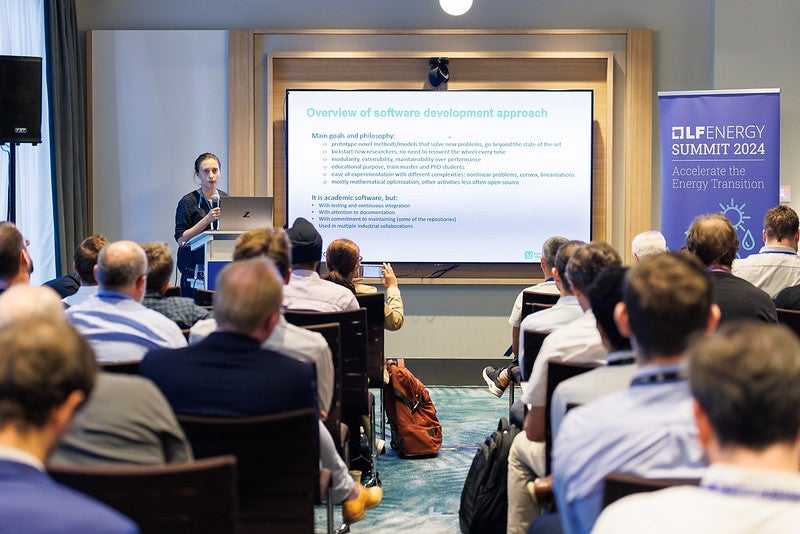LF Energy Summit Recap and Video: Decision Support Tools for Power Systems Planning and Operations
At LF Energy Summit 2024 in Brussels, Marta Vanin from KU Leuven and EnergyVille presented a session on “Decision Support Tools for Power Systems Planning and Operations,” highlighting their work in developing open source tools for power system analysis, particularly in the areas of transmission and distribution systems. Below is a summary of their key points, followed by the full video at the end of this post.
Open Source and Academic Collaboration
The session emphasized the importance of open source software in academic and industrial collaboration. Vanin highlighted that KU Leuven’s Power Systems Group started building open source tools to stay ahead of the latest technological, market, and regulatory developments. By making their software open source, they enable the community, including regulators and other academics, to access and contribute to their work, fostering reproducibility and rapid prototyping.
Leveraging Open Source Libraries
A key aspect of their work is built on Julia language-based power models, particularly PowerModels.jl and PowerModelsDistribution.jl, developed by Los Alamos National Laboratory. These libraries provide generic modeling frameworks for power systems that facilitate the creation of new models and tools for both transmission and distribution networks. Using Julia’s mathematical programming package, JuMP, their tools can handle both linear and nonlinear optimization problems, making them adaptable and scalable.
Challenges in Transmission and Distribution Systems
The session explored several pressing challenges faced by transmission and distribution networks, particularly in the context of the energy transition. These include:
- Changing System Characteristics: The increased penetration of inverter-based resources and power electronics has introduced new technical issues like harmonics and reduced system inertia.
- Uncertainty in Renewable Generation: The variability and uncertainty associated with renewable energy sources create new challenges for system planning and operation.
- Climate Resilience: Increased extreme weather events, such as those recently witnessed in Belgium, require tools that can account for and mitigate against contingencies like weather-induced failures in transmission systems.
Innovative Decision Support Tools
Vanin presented several innovative decision support tools that KU Leuven has developed:
- Transmission Network Expansion Planning (TNEP): Tools that integrate both transmission and distribution network considerations to optimize grid expansion.
- AC and DC Transmission Optimization: Tools that assess the feasibility of underground high-voltage transmission systems, which are more resilient to weather but also more expensive.
- Operational Coordination: Tools designed to handle bottlenecks in transmission systems, particularly in the context of increasing offshore wind power integration in the North Sea region.
Bridging Research and Industry
Vanin noted that their tools, while primarily designed for academic purposes, have applications in industry as well. Although the team prioritizes modularity and maintainability over raw performance, the tools are still performant due to Julia’s efficient libraries and solvers. Furthermore, their open source nature ensures that the tools can continue to evolve as new PhD students and researchers join the team, providing a lasting foundation for ongoing research and development.
Future Research Directions
Vanin concluded by discussing future research areas, including the possibility of more automated grid operation and the integration of steady-state and dynamic models into a cohesive decision-making framework. These advancements would help grid operators handle the increasingly complex and uncertain conditions brought about by the energy transition.
In conclusion, the session showcased the power of open source tools and academic collaboration in tackling the complex challenges facing power systems today, particularly in the context of renewable energy integration, system planning, and operational efficiency.
